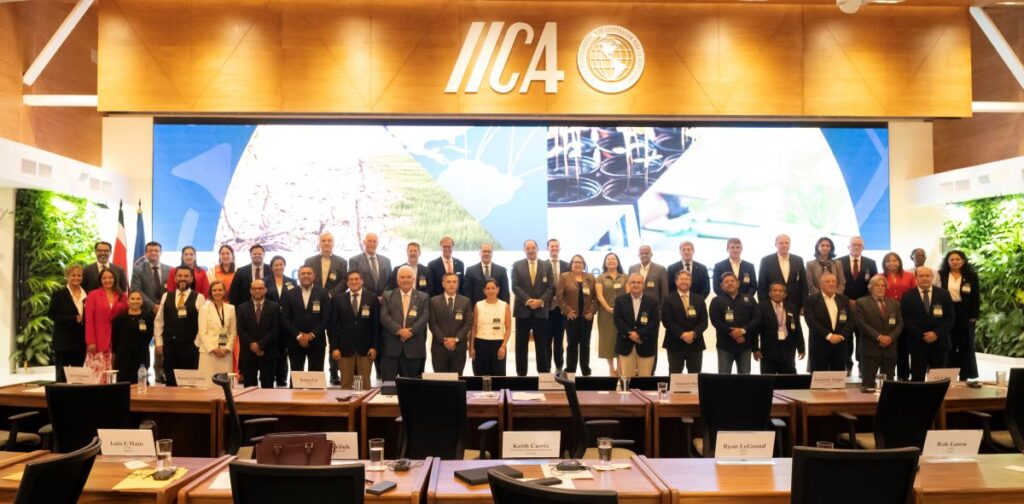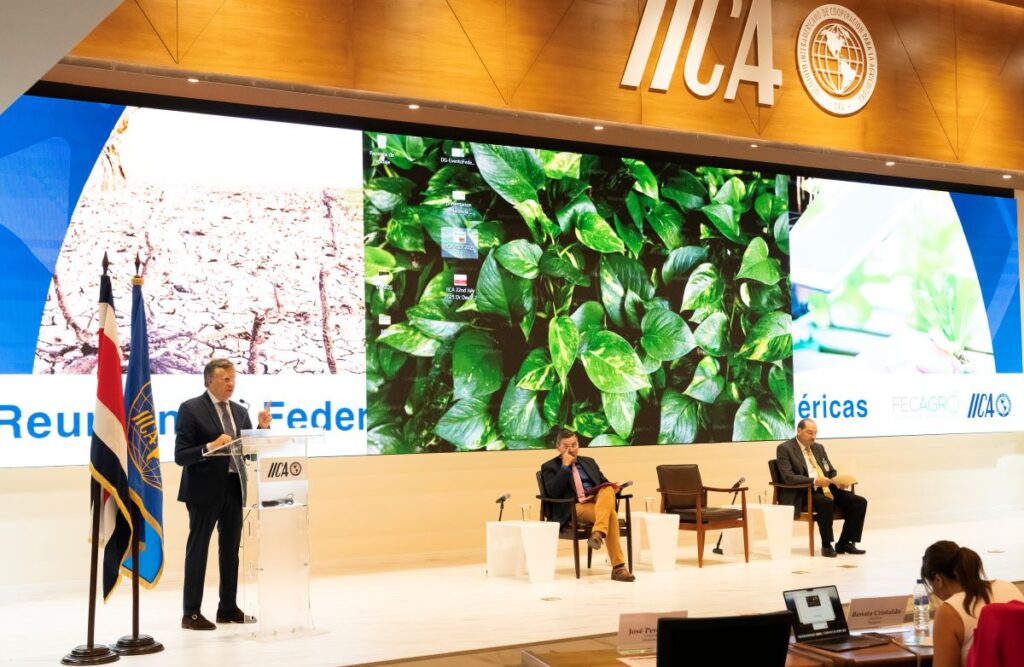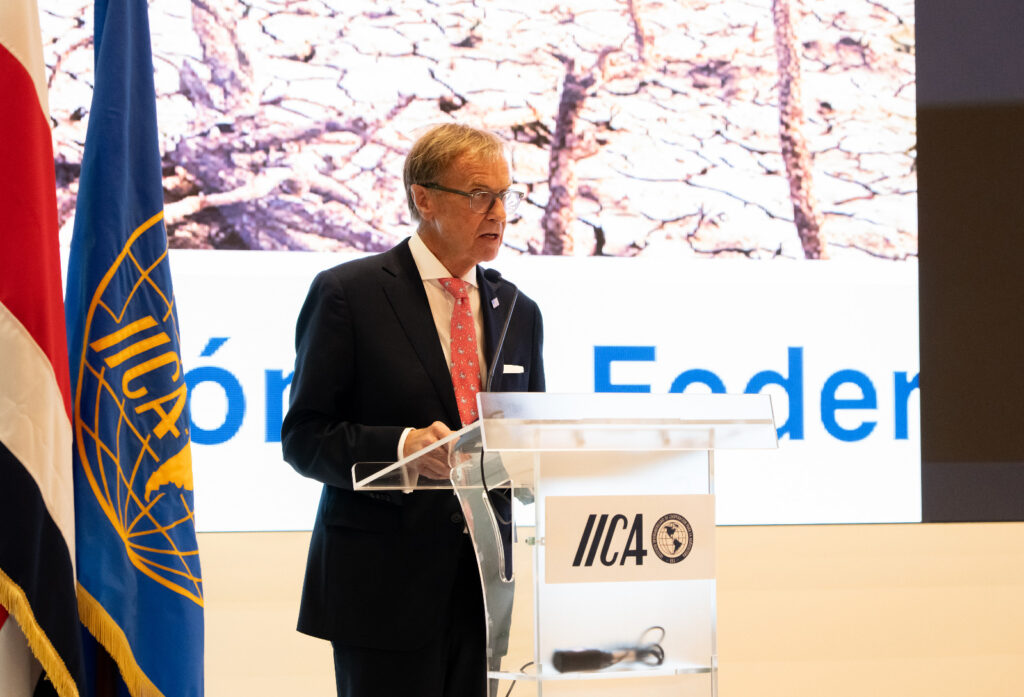
San José, 24 July 2025 (IICA) – Around twenty agricultural federations from 15 countries of the Americas signed a declaration with the Inter-American Institute for Cooperation on Agriculture (IICA) outlining regional priorities to respond in a coordinated manner to increasing regulatory, environmental, and trade-related demands affecting agriculture in the Americas.
The consensus was reached during the 2nd Meeting of Agricultural Federations of the Americas, organized by IICA and the Federation of Chambers of Agriculture (FECAGRO), in San José, Costa Rica.
The event brought together over 50 participants, including authorities, international experts, representatives from academia, multilateral organizations, and leaders from 23 organizations in the agricultural and agroindustrial sectors of 15 countries in the region. Its purpose was to strengthen regional collaboration, share experiences, and outline a common agenda to promote increasingly productive, competitive, and sustainable agriculture in the face of global challenges.
In the declaration, the Agricultural Federations of the Americas agreed on a shared vision highlighting the central role of producers in transforming food systems, the promotion of innovation for trade, sustainable soil management, the use of quality seeds, and a new narrative positioning agriculture as a solution to global challenges thanks to its significant contributions to food security. The declaration also emphasized public–private partnerships and science-based decision-making.
Additionally, FECAGRO requested IICA’s support in establishing a network of Agricultural Federations of the Americas to create spaces for technical and political coordination on issues of shared interest, as well as technical cooperation on the priorities included in the declaration and continued efforts to build bridges with producers across the Americas for the development of integrated public policies.
The opening of the meeting featured remarks by the Vice Minister of Agriculture of Costa Rica, Fernando Vargas; the President of FECAGRO, Francisco José González; and IICA Director General Manuel Otero.
“Only through effective cooperation, ongoing dialogue, and a shared vision will we be able to ensure that agriculture remains a pillar of food security and sustainable development in the Americas and around the world”, emphasized Vice Minister Vargas.
FECAGRO President González stressed that the Americas is a global leader in food production and exports, with a dynamic agricultural sector that generates employment, investment, and development. He underscored the need for a unified hemispheric voice based on technical principles and strategic vision to influence global forums, as well as the importance of strengthening public–private coordination to address common challenges and promote a shared agenda.
“The Americas feed the world: we produce 30% of the food consumed globally. Behind this productive capacity are more than 20 million producers. Agriculture in the Americas represents millions of business decisions that generate employment, integrate rural territories, and drive innovation. The sector’s competitiveness depends not only on work in the field, but also on fair trade rules, science-based regulatory frameworks, and access to technology”, González explained.
Otero, for his part, stated that a “strategic and rational defense of the agricultural sector in the Americas” is necessary, given its role as a guarantor of global food security and environmental sustainability. “Whether we like it or not, agriculture in the Americas is and will remain, for decades to come, a fundamental actor in global food security”, he said.

Key visions for agriculture, its future, and transformations
During the meeting, four keynote lectures helped drive dialogue and the exchange of ideas.
Kip Tom, farmer and former U.S. Ambassador to the UN food agencies in Rome, spoke about the agricultural power of the Americas and its vital role in food security. Renata Cristaldo, Director of Multilateral Economic Organizations at the Ministry of Foreign Affairs of Paraguay, addressed new trends in international trade, with a focus on commerce, sustainability, and market access.
The other two presentations focused on regenerative agriculture and soil health, delivered by Rattan Lal, a world-leading soil expert, IICA Goodwill Ambassador and World Food Prize Laureate; and on the new narrative for agriculture and agrifood systems, developed by IICA Director General Manuel Otero.
Tom offered a reflection on global food security challenges and the key role of agriculture as a driver of prosperity. He highlighted the need to strengthen food sovereignty, reduce external dependence, and work on public policies that promote resilient agrifood systems. He emphasized IICA’s commitment as a strategic ally in this hemispheric agenda and called on the Americas to lead with unity and forward-looking vision.
“If a nation does not have food security, nothing else matters—not military power, not the economy, not diplomacy. Agriculture is the foundation of everything, and IICA is the best ally we have to build a strong, fair, and sovereign agrifood system”, he said.
In her presentation, Cristaldo delved into the main challenges and opportunities faced by the countries of the Americas in the current context of global agricultural trade. She highlighted the need for coordinated responses to unilateral measures with trade impacts, such as those related to the environment, and emphasized the importance of strengthening public–private collaboration and regional coordination to facilitate market access and promote trade that contributes to sustainable development.
She also underlined IICA’s strategic role as a technical facilitator and articulator of common positions in international forums.
“It is time for this region to be recognized as part of the solution, not the problem. International trade can and must be a tool for sustainable development. To achieve this, we need fair rules, effective cooperation, and a strong voice from the Americas. IICA plays a key role in regional coordination, providing technical support, thematic follow-up, and strengthening capacities so countries can better position themselves in international forums”, she argued.
Lal highlighted Latin America’s strategic role as a global agricultural powerhouse and its capacity to lead the transition toward sustainable agrifood systems. He emphasized that regenerative agriculture, based on soil health and carbon capture, is key to addressing climate challenges, and proposed transforming agriculture into an environmental solution, with IICA as a central actor in this global transformation.
“Regenerative agriculture not only restores soils and captures carbon—it makes agriculture part of the climate solution. Latin America has the potential to lead this transformation, and IICA has been a catalytic agent in the region’s agricultural transformation. Its role will be even more decisive in leading sustainable agrifood systems on a global scale”, he stated.
Otero concluded the keynote addresses by presenting a renewed vision for agriculture’s strategic role in addressing current global challenges.
He noted that the Americas, with its weight in food production, biodiversity, and natural resources, is called to lead an agrifood transformation based on science, technology, and innovation. He presented cutting-edge examples in countries across the region and called for the construction of a new narrative for agriculture—one that positions it as a comprehensive solution to issues such as health, nutrition, and sustainability.
To achieve this, he stressed the urgency of a new generation of public policies and leadership with a territorial vision, as well as the need to coordinate efforts among diverse sectors and actors.
“A new narrative for agriculture must be constructive, forward-looking, and focused on opportunities. Today’s agricultural landscape shows us a sector strongly linked to science and technology—one that is part of the solution to global challenges. Agriculture in the Americas must be recognized as a strategic platform for generating economic, social, and environmental value”, he concluded.

Kip Tom, farmer and former U.S. Ambassador to the UN food agencies in Rome, shared a reflection at the event on global food security challenges and the key role of agriculture as a driver of prosperity.











